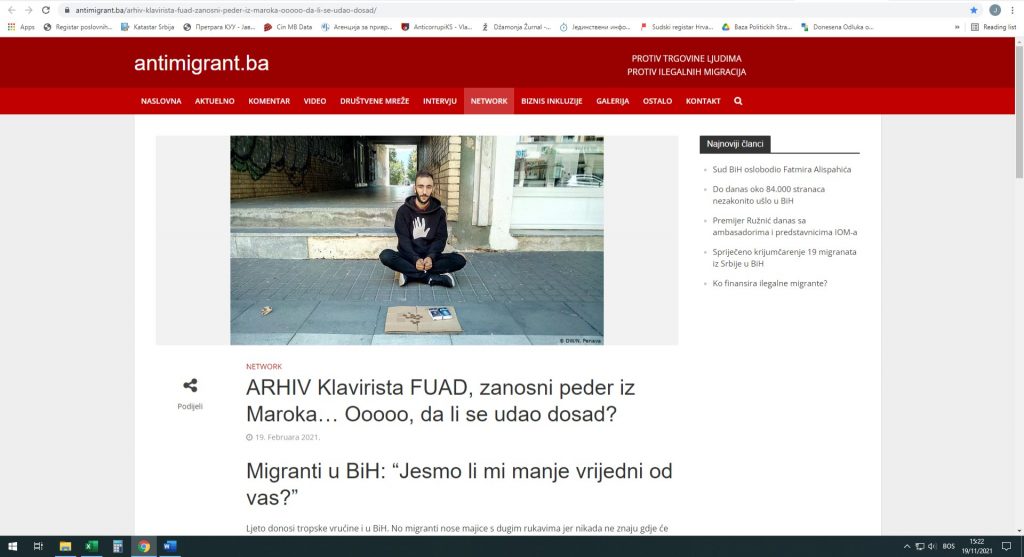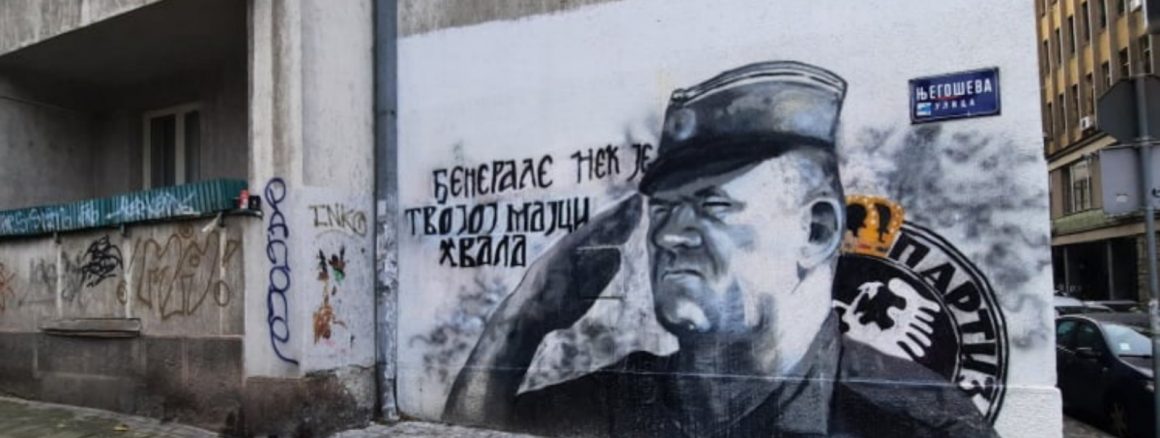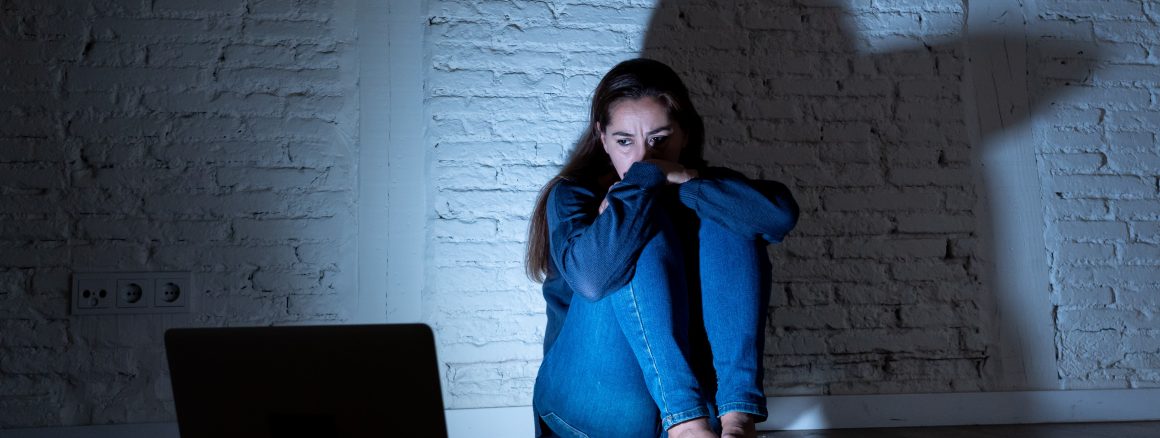Author: Ivana Jelača
TROLL OF THE MONTH: Member of the Parliament of Montenegro, Slaven Radunović
December 2, 2021
The Balkan Troll of the Month is an individual, a group of individuals or a media outlet that spreads hate on the internet based on gender, ethnicity, religion, or other diversity categories. The Balkan Troll is selected based on hate speech incidents identified across the Western Balkans region.
Our November Troll of the Month is a member of the Parliament of Montenegro, Slaven Radunović, who spread misogyny and sexist narratives which further undermine cases of sexual harassment and rape towards women on the basis of false accusations and gender discrimination.
Recently, during a discussion regarding chemical castration at the Committee on Political System and Justice, a Member of the Parliament of Montenegro, Slaven Radunović, spread strong sexist and misogynistic comments regarding the issue. Radunović stated: “let’s say a spoiled daughter is jealous of her boyfriend, so she reports him for rape, so considering whose daughter she is, that young man ended up as a rapist, and he gets castrated as well”. He went on to further point out that “sometimes a very thin thread decides in the decision whether there was rape or not”.
Following Radunović’s scandalous statement, there was a sharp and prompt reaction from the public who condemned such an “insolent statement” by the deputies and called on institutions to react and respond to such statements. The Safe Women’s House condemned the speech of MP Radunović, further adding: “we condemn this kind of speech and we wonder how to expect changes in the consciousness of the citizens of Montenegro when we receive such misogynistic messages from public officials”, highlighting the level of misogyny and sexism promoted and spread by an individual of political importance with a platform and large audience.
Furthermore, a number of public reactions appeared online in response Radunović’s statement and comments. This includes the Women’s Rights Center who posted a public statement calling on:
“the Speaker of the Assembly, the Collegium of Speakers of the Assembly, presidents of parliamentary clubs and all deputies to report such statements to the Committee on Human Rights and Freedoms”.
Not only was the incident shared widely given the fact that it was broadcast on numerous TV stations, it was also shared on various info portals and social networks as well. It is even more worrying when we take into account that the Parliament of Montenegro is streamed and was later uploaded on YouTube resulting in over 800 views.
Slaven Radunović, a member of the elected government, holds both a moral and democratic responsibility to be accountable for his actions and words. By using Parliament as public platform to share discriminatory stands regarding cases of sexual harassment and rape, Radunović further spreads sexism in Montenegro, with no consequence for himself.
Furthermore, upholding and spreading such ideas only results in further shame and creates a mechanism of silencing those who are victims of sexual harassment and rape who may fear being called out or accused of ‘lying’ about their experience. Radunović’s statement further supports prejudice against victims of rape and sexual harassment while disregarding the fact that these crimes are already rarely reported due to the pre-existing social stigma, which comments such as Radunović’s only perpetuates and maintains.
According to an article appearing in Antena M, written in response to the recent scandal, it was revealed through research that out of “100 women and girls who experienced sexual violence, as many as 88 did not report the case to the competent institutions”. The reasons for this include public shame, stereotypes, fear of not being believed and condemnation.
When addressing extremely sensitive issues such as rape and sexual harassment, it is vital that public, media and officials understand their responsibility and role in the spreading of messages and narratives to the public surrounding such issues. RDN 2.0 monitoring has uncovered that the perception and representation of women in Montenegro is already quite problematic, and such comments and incidents only fuel further the situation at hand while promoting and upholding misogyny and gender discrimination within society.
The role of the media is not to transmit an individual’s statement, no matter what their position is, without a critical attitude or any form of follow-up statement. This is especially important in the case such as the spread of discrimination and hate speech. The media have an ethical responsibility when reporting on such sensitive topics as sexual harassment and rape, and should therefore actively aim to participate in creating a safe space to talk without prejudice, fear and condemnation. The international campaign, 16 days of Activism against Gender-Based Violence, commencing on the 25 November calls for “the prevention and elimination of violence against women and girls” and reminds us that 1 in 3 women across the globe face gender-based violence once in their lifetime. Individuals need to be held accountable and incidents such as this further highlight the need for exposure and punishment of such comments and ideas.
Public Room: How the Macedonian Media Missed the Opportunity to Shed Light on Gender-based Violence
November 30, 2021
As the “Public Room” case remained unsolved for two years after its discovery, media coverage led the public in N. Macedonia to mistrust the country’s authorities.
Gender-based violence is one of the several forms of violence where victims are often blamed. In other words, girls and women who are often the victims of gender-based violence are partly or completely blamed for what happened to them by social and media discourse. Sexist matrices and patriarchal values that justify sexual violence and view the victims with suspicion because of their gender play a big role into such discourse.
The scandalous sharing of explicit content
“Public Room” was a chat group in the encrypted Telegram application with thousands of (male) members that first appeared in 2020 and then reappeared in 2021.Private photos and videos with explicit and pornographic content, social media profiles, telephone numbers, and other personal data of women and girls from Macedonia were shared without their consent. In November 2021 a report about the media coverage of LGBTI community and gender-based violence was published. It included a case study about the “Public Room” in which I made a comparative analysis of the media coverage of “Public Room” in 2020 and in 2021.
The case of the “Public Room”, apart from being criminal, was a scandal about gender-based violence in the country, but not everyone perceived the case as such. Social media were full of problematic narratives condemning the victims of the “Public Room” for the way they photographed themselves, the way they posted their pictures, why they had open-type Instagram profiles, etc. In other words, many blamed the victims for being victims and the media coverage of the case often did not help to dispel these harmful narratives.
Media sensationalism
In 2020 there victim blaming narratives dominated the media. Those who reported on such cases did not use accurate terminology when talking about the “Public Room”, they did not describe the activities in that group as crimes, and they did not have clear boundaries as to whom the perpetrators and whom the victims were. Instead, in 2020 many of the articles relied on sensationalism and capitalized on the social taboo about sex and pornography. This means that the 2020 articles lacked terminology such as “gender-based violence”, “sexual harassment”, or the fact that the materials were shared without the consent of the victims. Very often, even the word “victim” was absent from these articles, while the focus is on the scandal of the case.
Articles from 2020 also focused on the juvenile victims and the child pornography shared in the group, almost ignoring the adult victims and the victims who had only had their personal data misused. The absence of the voices of the victims is also noticeable. Because in 2020 the gendered component of the violence was generally not mentioned and there was no clear line between who the perpetrators and who the victims were, the media provided moralistic and ahistorical explanations for the alleged deviance of younger generations as the reason for the emergence of the “Public Room”.
There are two intertwined narratives that explain this alleged deviance, with more emphasis generally placed on the latter: (1) the uncontrolled use of social media among young people, and (2) a lack of family values. Instead of finding systemic solutions to this serious type of violence and demanding appropriate action by Government institutions, many articles blamed the parents, placing the blame within the private sphere of the family. An example that perfectly illustrates these moralizing narratives is an interview with the pedagogue Vesna Velkova what was published in “Women Magazine”. When asked for a recommendation on how to “protect young people from ending up in another ‘public room?’”, she says:
“If you ask me, telephones in schools should be banned by law, even though we have places where they leave them. My message is to the parents. Build strong foundations in the family so that we, in the schools, can build floors on top of that foundation. From my experience, I want to say only one thing to the parents. The children demand attention – everything else is less important to them.”
Evolution of media narratives in 2021
Unlike 2020, in 2021 the blame for the “Public Room” is not in the private sphere, but in the public sphere and the competent Government institutions. The narrative that implicitly accuses victims is almost non-existent in 2021 because girls and women whose images or personal information have been misused are properly framed as victims. Although it must be noted that, in addition to the inclusion of the word “victim”, the media in 2021 again rarely use other relevant terms, such as “gender-based violence”. This positive change in the reporting relies on the anonymous and public statements of some of the adult victims in the “Public Room”.
In 2021, in the first text about the new “Public Room”, the voice of one of the victims is now heard; there is a statement of an anonymous 22-year old girl who got in touch with the Sitel TV editorial office. The same article includes a quote from an expert from the civil sector, Irena Cvetkovikj, the executive director of the “Margini” Coalition, who correctly identifies the victims of the “Public Room” as victims and designates the activities in the Telegram group as a crime. In 2021 there have been few articles that moralize or sensationalize the case , as the focus is on the voices of the victims, the activists, and the civil sector.
By giving an opportunity to people like Ana Koleva, a 28-year old girl from Kavadarci and a victim of the “Public Room”, who spoke publicly about her experience, the media implicitly sided with the victims. In 2020, by ignoring the gendered component of the violence and framing the “Public Room” as a problem of the young people that was happening due to a “lack of family values”, the media subtly shifted some of the blame onto the victims.
However, in 2021, when victims like Ana Koleva and lawyer Marta Gusar were interviewed by the media, a clearer narrative was presented to the audience. This narrative is one in which the perpetrators are the ones who were sharing the pictures/personal data and sexually harassed the victims, while victims are the ones who experienced this type of cyberbullying. It is also a positive thing that in 2021, in addition to condemning the behavior of the perpetrators, government institutions that do not act and do not protect victims are also condemned.
A positive example that includes the voices of the victims and the civil society is an article by Republika about the “Public Room” protest held on 3 February under the heading “Violence against women is not a personal problem of every woman, but an obligation of the institutions”. With such a title, this article emphasizes that this type of violence is a systemic problem and points the blame towards the inactive state institutions, instead of condemning the individual behavior of the women victims:
“More than 500 citizens protested under the slogan “Public Room is a crime” at yesterday’s march organized by the Platform for Gender Equality, expressing disappointment with the system and the inaction of the institutions in the “Public Room” case, which is a crime in which countless women are victims of gender-based violence.”
The ‘time factor’ plays an important role in creating this narrative that moves guilt and responsibility tothe public sphere, as “Public Room” was re-introduced for the second time without any person being responsible for the crimes committed. The fact that the case remained unsolved for year after its first appearance led to public mistrust towards the authorities.
The lack of response from the authorities led to protests on 3 February and 8 March, with guerilla actions, as well as press conferences the Gender Equality Platform aimed at the Ministry of Interior and the Public Prosecutor’s Office. These public actions received adequate media attention and contributed to the creation of a new media narrative that targets state institutions rather than private lives.
The way gender-based violence and specifically the “Public Room” case are being reported in 2021 have improved compared to 2020. The media provided a platform to activists and victims and the blame has been redirected towards state institutions instead of women who are abused. However, journalists and media workers still pay less attention to the terminology they use in discussions about gender-based violence and sexual harassment. Although it is positive that the media implicitly sided with the victims, they missed the opportunity to educate the general public about gender-based violence as a systemic problem stemming from sexist and patriarchal values.
If reports related to “Public Room” had focused on the gendered element of violence and correct terminology was used in order to describe what happened in that Telegram group harmful discourses on social media would have been prevented.
With the use of accurate terminology, the media could have framed the “Public Room” case as a symptom of systemic gender-based violence stemming from deep-seated sexist and patriarchal values that permeate all spheres of our society. As a result of such framing, many people who consume media content could have been at least partially acquainted with these topics and sympathize not only with the victims of the “Public Room”, but also with future victims of gender-based violence.

Autor: Elena Gagovska, is a writer, researcher, and journalist who graduated from Bard College Berlin and currently lives in Skopje. She is interested in and writes about various political topics such as intersectional feminism, left-wing politics, anti-racism, labor, and LGBTI rights. She regularly publishes articles on the feminist platform “Medusa”, and has been published on many other domestic and foreign media such as Women’s Media Center, Summer of Solidarity, and Jacobin magazine.
Photo: PitukTV/ Shutterstock
THE DARKNESS OF THE BLACK CHRONICLES: The editorial policy of Kosovar media needs a gender perspective
November 26, 2021
The news about the murder of Sebahate Morina in March this year shocked and frustrated many in Kosovo. It mobilized feminist activists to protest in the streets, where they reiterated for the umpteenth time that femicide is preventable and that the state is failing to protect women’s lives. When Dardan Krivaqa and Arbër Sejdiu left the dead body of Marigona Osmani at the Emergency Center in Ferizaj in August, activists took the streets once again, accompanied by many others, to demand justice and call on the state to end femicide, this invisible pandemic.
Had activists not reacted publicly to the two cases, these murders would have been just a short brief in the “dark chronicles” of Kosovar media. They would have earned some quick glances at the headlines but would not have garnered any real attention.
The outdated dark chronicles news section — “kronika e zezë” in Albanian and “crna hronika” in Serbian, literally “black chronicles” in English — is found in most regional news publications, most likely inherited from the old Yugoslav press era. It seems to be an adaptation of American and British crime reporting which has been around since the early days of journalism. Newspaper owners noticed how reporting on crime, due to its attention-grabbing nature, appealed to people’s curiosity for the grotesque and was easy to sensationalize. Meanwhile, associating the color black with the crime section further emphasizes the lurid and the scandalous, suffocating the news with sensation.
Today, November 25, is the International Day for the Elimination of Violence against Women and Girls. The news will report that some public events are taking place, that in the evening some iconic buildings and monuments were draped in orange to bring attention to gender-based violence. Business as usual.
We will hear and read calls for actions in education, in the judiciary, throughout the government — the message being that we all have to step up. However, there is another powerful sector — the media itself — that maintains and reproduces harmful narratives about how women and men should be seen, and which perpetuates all the wrong images and messages about gender.
The fact that gender-based violence is treated as news fit only for the dark chronicles shows that most Kosovar media lack a gender perspective in their editorial policies. Taking cases from police reports and publishing them as daily briefs without putting them into context turns a long history of oppression into a simple show of violence.
The murders of Sebahate Morina and Marigona Osmani, like any other femicide, and in truth like any other form of violence, are just normal pieces of news for the vast majority of Kosovar journalists and editors. They have become something to file next to other news that arouses curiosity, such as theft, car accidents, police raids and fines for minor offenses.
In fact, the dark chronicle section itself is controversial; the moment an article enters that box, its content becomes completely detached from any social and economic context, remaining nothing but a poor rewrite of a police report. For example, reports of stabbings between men for a parking space, not uncommon in the dark chronicles, only reinforce the idea that conflictual situations usually end in violence. This style of reporting leaves unconsidered the importance of discussing toxic masculinity and the economic and social context that enables its expression.
When an outlet is privately owned in its entirety the search for profit leads to uncritical and easy to digest content which has a purely commercial purpose. As a result, the sensational representation of crime in the dark chronicles becomes necessary content. There is a long-running debate about how dominant ideologies and political, economic and technological factors shape the selection and production of stories, including crime reporting, but while that debate continues, Kosovar media must first eliminate the dark chronicles section, or at least leave gender-based violence out of it.
The style of reporting in the dark chronicles excludes narratives of economic violence. The reality of gender-based violence requires detailed analysis on underlying power and economic relations. This would help a feminist public debate that is often limited to women’s rights organizations.
Instead, almost systematically, the media re-victimizes women either through language formulations: “A woman is killed…”, “A girl is raped …”, or through the illustration. Everyone has seen photographs, commonly used in the media, where the attention falls on the perpetrator, standing in an attack position while the woman covers her face with her hands. With this, women continue to be portrayed as helpless victims. Something as simple as a header reading “Man kills a woman,” unseen up to now, would place responsibility on the perpetrator and offer the victims the dignity they deserve.
From the categorization of these articles to the language and pictures used, newsrooms need to show that they understand that femicide is not simply an offense and that putting it in the frame of sensationalism and entertainment devalues women’s fundamental rights. The role of the media is not to give basic information about one more murder, but to dig in and bring attention to the economic inequalities of the institutionalized patriarchy that enable and facilitate the killing of women. In the list of those who have the duty to fight gender-based violence and femicide, the media are at the top.
Author: Dafina Halili
Feature image: Anete Lusina / CC
This article was originally produced for and published by Kosovo 2.0 within the framework of RDN 2.0 project. It has been re-published here with permission.
This article was produced based on the media monitoring done by the Reporting Diversity Network 2.0, with the financial support of the European Union, Balkan Trust for Democracy, a project of the German Marshall Fund of the United States, and the Royal Norwegian Embassy in Belgrade.
Quo vadis, Serbia?
November 24, 2021
How did the defenders of Serbia’s shameful past get the right to paint murals of war criminals?How did we get to the point of considering activists as rioters and arresting them?
In commemoration of the International Day against Fascism on November 9, the Youth Initiative for Human Rights in Serbia announced that it would paint over a Belgrade mural dedicated to General Ratko Mladic, whom the International Court of Justice in The Hague found guilty of genocide in Srebrenica and crimes against humanity. The mural appeared in Vracar (an area in Belgrade) last July, on the corner of Njegoseva Street and Aleksa Nenadovic Street. It stood on the building despite the decision of the municipal authorities, which, based on the request of the tenants, ordered it to be removed. In those few months, the citizens drew on and painted over it, but it would always be restored to its original state.
In the meantime, the Youth Initiative for Human Rights canceled this gathering, because the police, under the pretext that there could be a conflict between supporters and opponents of the mural, did not give them permission to hold it. Despite that, anti-war and anti-fascist activists, journalists, cameramen, but also defenders of the character and work of Ratko Mladic, appeared at the scene of the canceled event. Among them were activists Aida Corovic (Belgrade Circle, Women in Black, Center for Anti-War Action and Organization, Urban In …) and Jelena Jacimovic (illustrator and designer) who at one point threw eggs at the mural. After that, unknown young men in civilian clothes rushed at them. However, it is not known whether they were supporters of the mural or police officers in civilian clothes because they did not present themselves. With a lot of pushing, squeezing and pressing, the two activists were taken to the Vracar police station. They were released a few hours later, and Corović said that the police behaved decently there.
From that moment on, in Belgrade, in Serbian and regional media, and on social networks, tensions between people have not stopped. On the one side there are those who think that convicted war criminals should be only in prison and not on murals. On the other, there are those who leave flowers in front of Ratko Mladic’s mural , “cleaning it of activist eggs” and from the paint that Djordjo Zujović, an official of the Social Democratic Party of Serbia, threw on it.
After that, there was a series of announcements, actions, and reactions of anti-fascist organizations, but also pro-government tabloid media, which, as usual, dangerously manipulate the facts. One of them blamed their favorite target – LGBT organizations – for trying to remove the mural. Protests were organized: one because of the arrest of activists, another because of the refusal of the authorities to remove the mural. In addition to everything that was happening, members of right-wing groups guarded the mural for days, and organized rallies in support of Ratko Mladic.
After the events in Njegoseva street, Aida Corović gave an interview. She pointed out that Serbia is her country and that she is ashamed that a war criminal adorns the wall of a building in her Belgrade. She said that the state must not take the side of war criminals. She warned that the citizens of Serbia have two choices: either to be a society of hatred, or to become responsible for their actions, and thus the future.
State reinterpretations
The Minister of Internal Affairs of Serbia, Aleksandar Vulin, also spoke about the “mural case”. He said that “Belgrade is a city of anti-fascists and victors” and that on the International Day against Fascism “no one in Belgrade will clash in the streets and spoil the lives of our citizens”, and that “no one will make Serbian enemies happy with bloody heads.”
The President of Serbia, Aleksandar Vucic, also reacted, saying that the activists were making a circus in the streets. The president claimed that police officers were protecting public order and peace, not a mural which could have been removed by the activists much sooner. They only did it now to show Serbia in a bad light and prevent it from getting an important “point abroad”. If the police had not reacted, everyone would have asked why the police did not react, Vucic said; and then asked why activists against the mural did not tear down the plaque dedicated to Acif Efendi in Novi Pazar on the same principle. Acif Efendi was an Albanian politician and manager of Novi Pazar during World War II who was executed by Partisans for cooperation with the Germans.
Due to all these events, the European Parliament also reacted. In their statement, they opined that it is unacceptable for a mural of a convicted war criminal to be protected by the police in a EU membership candidate country. They added that the event is a sign of what the Serbian government thinks about reconciliation, the rule of law, democracy and regional cooperation. The parliamentarians, of course, forget that Vucic’s attitude towards the Hague Tribunal and its decisions varied depending on the position he held. The President of Serbia reacted to their statement, saying that the parliamentarians did not react to the fact that a mural of war criminal Slobodan Praljak was standing in one EU member state (Croatia).
The defeat of all values
Ratko Mladic’s mural and everything that happened around him as a person divides and creates dilemmas for the Serbian society that has not reconciliated with its past. Fortunately, there are also voices of common sense.
Activist Jelena Jacimovic, who was arrested along with Aida Corovic, believes that the wrong ideals in our society are a systemic mistake, primarily of education, upbringing and patriarchy. In an interview for autonomija.info, Jacimovic said that “generations are being created and uncared for, and they are being told that their value lies only in the army or labor force.” She added that “A woman is only valid when she gives birth and when it is the eighth of March.” She thinks that what is valued is “not learning while in school, not thinking critically in college and not making your own conclusions in life”, and that it is logical for a person in such circumstances, when they have nothing else, to yield to public opinion and sink into anger.”
Retired law professor Vesna Rakic Vodinelic reminded on the TV network N1 that “fascism is no longer a marginal phenomenon here” and that “the situation in the country is radicalizing people because right-wing groups are growing, and they are more extreme because they are now more organized.” She pointed out that this did not begin yesterday, but quite a while back. As a trigger for additional aggravation, the professor considers the passage of migrants through Serbia. It caused the creation of some groups that took police powers and authority upon themselves. “We can consider them parapolice groups that stifle democracy,” said Vesna Rakic Vodinelic.
The best answer to what citizens can do and how they can try to prevent the Serbian people from turning “big right”, was given by playwright Minja Bogavac. Reacting to the event, Bogavac said that she was embarrassed because she was not with Aida Corovic that day. In the conversation, however, she tells RDN that there is no optimism at the moment: she thinks that the citizens will not do anything in the end. Neither on the occasion of this, as she calls it, disgusting case, nor on the occasion of 10 others, equally disgusting, which shake our society with equal intensity:
“In such situations, nothing ever happens. The topic is just cluttered with a bunch of other topics. The social chaos in which we live is so great that we do not know where to start tidying up, ” says Bogavac, before asking herself: “Maybe we should not tidy up, maybe we should be left to attack each other in front of that wall. Maybe we should just be left to rot there, as individuals and as a society. ”
“I’m terribly sad about everything,” continues the playwright, who has shown exceptional social responsibility so far, “For the first time in my life, it seems to me that it’s not worth fighting for. It is clear that the genocide in Srebrenica was not a random accident. It was a well-thought-out and planned policy for which a part of the people in Serbia would still vote today, which they still glorify and support, they paint it on the walls that they then defend with their bodies. If we have not been able to face the past in 30 years, should we have a future at all? Should we try at all or is it time to give up on what we once considered our country and our society? The fight has never seemed more futile to me. Fascism is everywhere. It is growing up. It is being nurtured. The state is directing it, and its top figures are more and more openly putting their signatures on the scribbles on the walls. To my great regret, I accept the complete defeat of all the values I have ever believed in “, Milena Bogavac concludes.
The streets of Belgrade in the 1990s
Snjezana Milivojevic, a full-time professor at the Faculty of Political Sciences in Belgrade, believes that the civil resistance, although seemingly not considerable, is still visible, which is encouraging. Regarding the whole case, she says:
“At this moment, I am least interested in that juggling, the story of whether something is being covered up or the topics are changing. I am interested in the essence – that a conflict appeared on the streets of Belgrade, which indicates a scar that deeply tears the fabric of this society, a conflict around which there are very opposing views in society. And it is unfortunate that the views are opposing on this topic. And so many years after the war, as soon as you scratch the surface, every problem of this society turns into a problem of an unresolved relationship with the past and the fact that the wars of the 1990s, unfortunately, came to the streets of Belgrade a quarter of a century later. It is now apparent that this society has been torn apart on that basis. It is inexplicable and strange to me that these pro-fascist, militant, pro-war, radical groups that are defenders of the criminal past, were given the right to paint a mural and take to the streets. In the first decade after the war or in the short decade when Serbia was still democratized, it never occurred to anyone that this would happen. I see this now as a big step backwards. It is a restoration of reading history in a way that supports the current authorities,” Milivojevic tells RDN.
Milivojević also points out that the fact that the civilian public, the Serbian society, still opposes all this is encouraging, although it seems that the resistance is not massive. She says that she would have liked for the citizens on the streets to make more of an effort to show that this cannot be done in Belgrade, or Serbia for that matter.
“The fact is, however, that these militant right-wingers and pro-fascist groups must now watch and guard the mural day and night. It would be comical if there were no serious crimes behind that image, that symbol. Now, therefore, the most angry right-wingers must organize themselves to protect the images in order to oppose the eggs. I am not trivializing the event, because, both on the occasion of this case and on the occasion of Captain Dragan’s petition, it is clear that these radical and pro-fascist groups are set on their way. They have the support of the government, but society opposes them. Unfortunately, the government is on their side, and not on the side of the society, and that is one of the historical side roads on which Serbia was in the 1990s as well. Back then, the same people participated in the government as they do today. However, there are parts of society that understand that we paid too much for that lesson, and that the same thing will not be possible this time around.”, concludes Snjezana Milivojevic.
The latest case of Ratko Mladic’s mural in Belgrade, as well as many previous outbursts of fascism in the Serbian society that is taking form through regime media, tabloids, stadiums, pop events, quasi-patriotic events show that Serbian society is not up to democracy.
Quo vadis, Serbia?
Author: Snežana Miletić
Photo: Aulone Kadriu
Editor of the Antimigrant portal acquitted of Charges of Inciting Intolerance Against Migrants
November 23, 2021
Fatmir Alispahić, founder and editor of the Antimigrant portal, was acquitted of charges of inciting national, racial, and religious hatred, strife, and intolerance.
In the rationale of the verdict of the Court of Bosnia and Herzegovina, Judge Goran Radević explained that Alispahić was acquitted, among other things, because the Prosecutor’s Office of Bosnia and Herzegovina in the evidentiary procedure failed to point out specific statements that provoke national, racial, and religious hatred.
The Prosecutor’s Office of Bosnia and Herzegovina pressed charges in September this year, accusing Alispahić of publishing texts and videos through the website Antimigrant.ba and social networks in 2019 and 2020 that incite hatered towards migrants, including between peoples within Bosnia and Herzegovia.
Alispahić rejected the proposed plea bargain, which included a one-year suspended prison sentence and a fine of 1,000 BAM (around 500e).
He wanted to go on with the trial, basing his defence on the agument that the Antimigrant.ba portal was a platform used to inform the public about the migrant crisis in Bosnia and Herzegovina. During the trial, he testified on his own behalf, saying that in 2018, he was the first to point out the inhumane conditions in which migrants live.
In the form of evidence, the Prosecution presented the author’s texts as well as other media posts published on the Antimigrant.ba portal. In one of those texts, he stated that “ISIL migrants are being transported to Bosniak majority areas to complete the genocide against Bosniaks.”
The contents published in other media are often reposted under provocative headlines on the portal, including the story about hosting migrants in Zavidovići headlined/titled: “There is no humanity in betraying the homeland!!! A Bosniak from Zavidovići hosted migrant bandits!”

Early this year, portal Antimigrant.ba reposted one of the articles of Deutsche Welle (DW) about three highly educated migrants whom their reporter met on the streets of Sarajevo. One of the migrants mentioned in the text was Fuad, a piano teacher from Marocco, who was not able to find a job in his country because he was gay. Antimigrant.ba published the text in its entirety, furnishing it with an insulting headline “Pianist Fuad, an enchanting fag from Morocco… Ooooo, has he married yet?”.
Humanitarian activists and journalists who fight for the rights of migrants and refugees are often targeted by the antimigrant.ba portal.
Neither the accused nor the prosecutor were present during the sentencing. (As this is the first-instance verdict, there is a possibility of an appeal).
Authors: Ibro Čavčić, Jasna Fetahović
Photo: Gorodenkoff/ Shutterstock
Call to media: putting an end to sensational reporting on the murder of the minor in Fier
November 19, 2021
Reporting Diversity Network 2.0, concerned about the way the media are reporting the case of the murder of a minor from Fier, draws the attention of those behind the sensational headlines and reports, in order to take measures in stopping harmful reporting practices. Not only the nature of the crime, but the way it was reported in the media in particular, have deeply shocked the Albanian public.
The reporting of details with sensationalism and the inappropriate treatment of the affected family, as well as the proceedings of the case itself, are in violation of the Code of Ethics of Albanian Media, especially in relation to the intrusion into private life, the reporting of accidents and disasters, and the protection of children. The unethical gathering of information from the minor’s relatives has been noticed, accompanied by violations of privacy, excessive and unnecessary interference in the lives of family members, as well as large-scale and widespread violation against the audience.
The media coverage of crime and violence has been completely sensationalized. Lack of self-restraint by media outlets and journalists has been obvious. With their reporting, these outlets and journalists have not only psychologically and emotionally harmed the family affected by the tragedy, but affected the entire public.
Journalists are obliged to respect the suffering and feelings of family members, as well as to show prudence with photos, images, and videos of the crime scene and its aftermath, which in this case have exceeded all limits. Inadequate reporting of such crimes not only hurts the public, but above all completely ignores the suffering of individuals affected by the crime. Furthermore, such media coverage even exploits this suffering, and consequently leads to the deterioration of the mental state of the affected family and community.
We remind news editors and journalists that human values stand above all and, as such, should take precedence over the need to inform, especially when the information provided is not a necessity of public interest. The Code of Ethics clearly states: “Legitimate public interest does not justify sensationalism and, in the spirit of this Code, it should never be confused with information that is “interesting to the public.””
HATE SPEECH IN THE WESTERN BALKANS: October Monthly Highlights
November 10, 2021
Throughout the month of October, the RDN monitoring team has detected a range of hateful narratives and discourse. During this month there has been a rise in hate speech including ethnic discrimination, homophobia and sexism across the Western Balkans.
Homophobia in Albania and Serbia
Pristina artist Astrit Ismaili appeared at the Athens Biennale dressed as Miss Kosovo. This As the Athens Bienale was broadcast on Greek national television leading to the Albanian national television, Top Channel. Top Channel picked up Ismaili’s appearance and reported on it with the headline ‘With a pink dress and make-up, the Albanian artist makes Greeks go crazy’. Top Channel’s coverage led to homophobic comments and anti-LGBTQ+ comments under the article on Top Channel’s Facebook page.
These comments included homophobic hate speech with highly offensive and derogatory names used to label individuals from the LGBTQ+ community. For example one Facebook account wrote: ‘I’m so sorry you call these people artists; this is simply a mentally ill person’. Not only are such comments extremely hateful and promote homophobia and queerphobia within society, but there is an additional element of undermining the human dignity of LGBTQ+ community members by labelling them as ‘mentally ill’.
This is not the only instance of homophobia spread by the Albanian media in the country. For example, recently Pastor Akil Pano shared on Facebook, a form handed out in a kindergarten in Tirana where the terms ‘mother’ and ‘father’ were replaced with ‘parent 1’ and ‘parent 2’. Pastor Pano argued that these were in violation of the Albanian Family Code. He called this an example of the ‘Gay Agenda’ and imposition of the ‘gay community’ on family values. The LGBT Alliance released a public statement affirming that they had no information regarding the form or who created it, and criticised the media for fabricating information for public consumption.
In another incident, former Prime Minister (PM) Sali Berisha wrote a post of Facebook criticising the current PM Edi Rama for undermining family values. Furthermore, he highlighted that the homophobic and anti-LGBTQ+ rhetoric is being both spread and upheld by high political figures. Such statements only support hate speech and discriminatory attitudes in society.
In Serbia gender-neutral toys have been introduced recently to the market. This has opened a debate surrounding the topic of gender-neutrality.
Media narratives about gender-neutral toys have been followed by some problematic statements such as calling it a ‘campaign to completely eliminate gender differences’ in an attempt to, what these narratives describe, ‘become asexual beings’.
Across the media the terms ‘sexless’ or ‘same-sex’ dolls were used which indicates the complete lack of understanding of the subject and unprofessional attitudes towards the topic.
The overall debate about gender neutral toys not only that does not contribute to the understanding of gender equality but also fosters stereotypes and prejudices about the LGBT community.
Furthermore, sensationalistic headlines that mention the risk of ‘confusing children’, leads to a fear amongst the public on the basis of false accusations and homophobia.
The way that such topics are being covered is yet another reminder of the importance of education of journalists and media workers on the reporting of diversity, minorities and marginalised groups. This further highlights the importance of the role of journalists on educating the public and creating preconditions for an inclusive society that accepts and embraces diversity.
Ethnic discrimination in Montenegro and Bosnia and Herzegovina
In Montenegro, TV presenter Mirka Devic, presenter of the news programme Dnevnik, broadcasted on the new television channel RTV Podgorica, spread strong xenophobic and religious hate speech towards believers of the Serbian Orthodox Church . The presenter started off by associating Serbian Orthodox believers to murderers and armed robbers by saying that “members of extremist Orthodox organisations prone to robbery, violence, usury and murder can be recognised by the fact that they have tattooed crosses on their bodies, and mouth full of the Ostrog monistiry. Don’t steal, don’t kill, love your neighbour as yourself, they translated as kidnap, kill, hate everyone who is not like you”.
The above are just some of the sentences and insulting comments reported and expressed by the presenter of the news program. This is extremely harmful as such religious hate speech was spread during the news programme with a wide audience in a politically very sensitive moment for Montenegro.
Religious, ethnic or any similar affiliation must not be associated with violations of the law and committed crimes. Even if a member of a particular religious or ethnic group commits a crime, this crime cannot be associated or attributed to a whole group. The media must report impartially and objectively, in accordance to the standards of the profession and codes of ethics and they have a responsibility to prevent the spread of false accusations leading to discrimination and hate speech towards various ethnic and religious communities.
In Bosnia and Herzegovina, the portal antimigrant.ba reported on the killing of Jasmin Berovic in November 2020 by creating a hateful headline linking the murder to ‘migrant bandits’. The article further spread racist and xenophobic hate speech towards the migrant community including strong Islamophobic rhetoric.
The article questioned the integrity and belief of the Islamic Community by accusing them of being a security threat and dangerous. The article read ‘are they the ones that the Islamic Community presented to us a ‘brothers in faith’, false ‘muhajirs’ fleeing the war from countries where there is no war (Pakistan, Morocco, Algeria, Egypt etc.)? Are they the ones that the paid w****-journalists presented to us a ‘humanitarian obligation’, instead of focusing on the security threat and thus directly helping the mafia network of traffickers?’.
Such comments are not only extremely hateful and factually untrue, but they are also extremely insulting to migrants, and harmful for the entire society as it creates an atmosphere of fear and insecurity.
Antimigrant.ba, as the name suggests, is an extremely hateful news portal which spreads strong anti-migrant narratives and reports negatively on migrants in Bosnia and Herzegovina. Recently, the State Prosecution has initiated a process against the portal, but the Editor in Chief pledged not guilty, and the portal continues working in the same manner despite the ongoing Court process.
Sexism and sexual harassment in North Macedonia and Kosovo
In North Macedonia, it emerged that a private Facebook group – shared a number of indecent nude photos of underage, young Roma girls. This group has allegedly been created by a Roma citizen, however, the nationality and ethnic identities of the creator and members are not known or confirmed. These photos were shared without the knowledge or consent of the individuals appearing in the photos. However, such activity is clearly illegal as the girls were underage.
The Facebook group itself had more than 2000 members. The group’s members were encouraged to send and share photos from private messages and public social media profiles of young Roma girls within the group. After the photos were shared among the private group members who commented under the pictures with a vast number of hate speech and inflammatory comments including labelling the girls as ‘indecent’.
Despite the immediate reaction of a number of human rights NGOs who are seeking to pursue legal action against the users who were involved in creating the private group, it must be noted that this is not the first instance of explicit, non-consensual distribution of photos of girls on social media. Earlier this year, the ‘Public Room’ scandal involved the sharing of indecent content on the messaging system Telegram.
This is not only extremely harmful and illegal but further exposes the importance of rigid social media regulation and mechanisms in place to prevent such scandals and inappropriate content from being shared on social media platforms. Furthermore, it highlights the importance of collective action in demanding a reaction from authorities and social media companies in removing such content. It additionally emphasises the responsibility and moral duty of social media companies in preventing such scandals from occurring and ensuring there are consequences in place to punish such behaviour.
In Kosovo, an article about a husband who kicked his wife out of her house and was later arrested by the police was recently published on the online newspaper ‘Gazeta Express’ and was also shared on its Facebook page. According to the wife, she had an argument with her husband over her property, whereby, her husband did not let her stay in due to the fact that she did not take adequate care of his mother.
This incident spurred a number of hateful and sexist comments towards the victim including a large support for the husband’s actions based on the argument that, as one commented: ‘why does a husband need such a woman when in difficult days – she does not come to help when needed, the husband did the right thing’. Another comment called for the husband to have ‘beaten her well in the end’.
As Kosovo is still a traditional society in which strong traditional gender norms prevail within smaller and rural areas, such cases of women being kicked out of their houses following misunderstandings with their husbands are evident. In such cases, the victim rarely informs the police, especially in the case where husbands either live in the house or apartment of their wife or of their parents. In such situations, the victim is left helpless and often does not receive the necessary support of the public, and indeed as the aforementioned incident shows , is often faced with extremely hateful, sexist narratives.
THE PASSIVITY OF THE INSTITUTIONS TOWARDS THE (RESURRECTION OF) THE PUBLIC ROOMS
November 8, 2021
It looks like the Macedonian society as a whole has been turned into a large public room, into a voyeuristic chamber in which everyone caresses to peek into the intimacy of a stranger and to appropriate a part of the privacy of the other. This, coupled with the slow or non-existent reaction and the absence of public prosecution actions and forensic investigations, inevitably leads and have already led to new virtual rooms in which the malicious curiosity of some of our fellow citizens creates new victims and a real psychological terror.
In October, new and disturbing news echoed in the storm of information in the public, which was notified by the association of citizens “Initiative for Rights of Women from Shuto Orizari”. The civil activists said that many of our fellow citizens, mostly of Roma ethnicity, are subject to humiliation on Facebook with the sharing of their explicit photos on a FB fan page. The idea through such attempts to compromise, and even blackmail the victims, to present them as the so-called “dishonest women” follows after months of silence and the prior existence of several groups on similar social media, where the reaction of the society was strong but the reaction of the relevant institutions was weak.
The demoralization and devaluation of our fellow citizens is least what they deserve, and witnesses for that are we, as a public, and them, as victims. It is not only impermissible, but also punishable behavior. However, all those sanctions that we as a country have foreseen in our legislation and for which, undoubtedly, we stand well declaratively, require vigilance and agility in order to be put into use – the Ministry of Interior and its Department of Cybercrime and Digital Forensics and the Public Prosecutor’s Office. We have read enough about the responses from those in charge – that action is being taken, actions are being taken and other expressions that the public, justifiably, is beginning to perceive as “phrases”. Specific sanctions continue to be missing, and the victims are left to fend for themselves.
As I was already alarming in one of my previous blogs, we must put an end to this institutional anemia. The reactions of the prosecution authorities are continuously missing and this openly raises the question what is the level of awareness of the police and of the public prosecutors, who obviously do think that these criminal acts should get the attention they deserve. The discrediting of individuals whose intimate photo is shared in various groups on the social media with many members, including the inadmissible actions, results in a series of other criminal acts, including hate speech. Again, even this is not enough for the public to hear about some more relevant activity implemented by the basic public prosecutors on this topic. On the contrary – all we hear are situations of additional harassment and abuse of the situation of the victims where photos are published even about those activities who will raise their voice, in order to blackmail and silence them.
On the other hand, the incrimination of one of the most recently introduced acts, such as stalking, which is to be welcomed, but which, as is well known, is stuck in the legislative labyrinths, is not and will not be enough in itself. The criminal experts in charge of enforcement and prosecution now have all the necessary tools to reach out and prosecute the perpetrators involved in the last of our series of “public rooms”. The revelation of these previous virtual spaces remained somewhere in the weak cooperation on the social media at which the groups were created and the quiet passivity of the Macedonian institutions. Disturbing comments about the nudity of the victims continue to the point that even women who do not live in the country are commented on, and even photos of the minor children of the victims are also shared.
We know to say that the community in which we in our daily life is becoming difficult to live in. Talking about this, we often forget how difficult this environment is for the victims of such acts, who have to live with double victimization, with the silence of the competent institutions that they finance through their taxes, and even with their “tacit consent” with the acts.
Both the theory and practice show that the passive attitude of the prosecutors can be also interpreted as a kind of encouragement of the stalkers, and that this is the message that we as citizens should stop. And the scanty information that “action and investigation is being carried out” and like that indefinitely, for many, is exactly that – support for new and new public rooms.
The culture of impunity for non-compliance with the norms, which has persisted through all the past years and in almost every possible field, from traffic to education and even the election process, in these cases is even more frightening, knowing what kind of intrusion into someone else’s privacy is this. As if that were not enough, these public rooms first end up in a “public court” of the public, and much later and always the question remains whether those who are members will face the real court, as perpetrators, and end up with any responsibility for their conduct.
The pornographic content and the significant number of sex voyeurs present in our environment is a phenomenon that must worry us as individuals. The games with the privacy of the individual, know how to knock relentlessly on everyone’s door and hence, the constant pressure to act on the authorities must be our guiding thought.
The periodic news about new public rooms that we are shocked by only confirms the fact that the public room did not happen to us again, but it actually never closed. The main trump card that the institutions have – acting after the voice is heard – it is like it does not exist in the Macedonian gray milieu, and that must be the number one step that will be taken first. The other thing that remains available from the spectrum of measures – supplementing with new crimes and legal changes, educational campaign and regional action – is only an additional part of the toolkit that will not come to life if the former continues to evade. The Ministry of Interior must start to deal more seriously with the “interior” in the frequently present predatory groups on the social media, because otherwise it is only a matter of time before the public will again be intrigued by news about new public rooms.
Author: Ivan Durgutov MA
The article was first published in ResPublica, where you can read it in Albanian and Macedonian.
Foto: SB Arts Media / Shutterstock
TROLL OF THE MONTH: A private group on Facebook who shared inappropriate photos of underage Roma girls
November 2, 2021
The Balkan Troll of the Month is an individual, a group of individuals or a media outlet that spreads hate on the internet based on gender, ethnicity, religion, or other diversity categories. The Balkan Troll is selected based on hate speech incidents identified across the Western Balkans region.
Our October Troll of the Month is a private group on Facebook who shared inappropriate photos of underage Roma girls without consent which is both illegal and goes against all ethical guidelines promoting further gender-based violence.
It recently became known to the Northern Macedonian public that a private group on Facebook with over 2000 members was sharing nude photos of young Roma girls without their consent or approval. Indeed, the users themselves were encouraged to share photos from their private messages and public social media profiles of these young Roma girls after which, users would comment under the photos with hate speech and inflammatory comments including negative labelling of the girls being ‘indecent’. This incident further created a dynamic of hatred and shaming against an already highly marginalised social group.
The group was allegedly created by a Roma citizen and most of the users who had joined it where from the Roma community. However, the exact profiles of the members themselves are not entirely known due to the private nature of the Facebook group.
This is not the first case of social media groups sharing explicit photos of girls, following what was known as the ‘Public Room’ scandal earlier this year. The Public Room affair included some ‘7,000 users, who shared explicit pornographic content’ on the messaging system Telegram – the first instance of its shutdown was back in January 2020 following public outcry, however, the same case re-emerged one year later before being closed down again on the 29 January. In both instances explicit content of often under-age, young girls was shared illegally and without consent on social media platforms.
According to North Macedonian police, it has been confirmed that since the start of the Covid-19 pandemic there has been an increase in ‘instances of online sexual abuse’. This emphasises the seriousness of this case and the need for mechanisms in place to prevent, react and respond to online sexual harassment and violence against women and girls.
The group that was sharing nude photos of Roma girls has since been deleted from Facebook following public outcry after its discovery and the revelation of its activities. Furthermore, a number of human rights NGOs are pursuing legal action against the users who created the group.
Nevertheless, these legal actions led to a number of hate speech comments and personal attacks towards the president of the most vocal NGO. Presumably, those who are associated with the group shared his family photos in a series of relentless attacks that included a number of hateful comments.
Despite the positive action being made by the civil society who reacted immediately to the authorities and demanded that the group be removed from Facebook, there is a bigger issue at hand.
As this is not the first instance of indecent, illegal photographs of underage girls being shared on private groups on various social media platforms, this case raises the important question of the mechanisms of protection and regulations in place to prevent such events from occurring. Not only is such content extremely harmful and illegal but it also exposes the importance of rigid social media regulation and mechanisms in place to prevent such scandals and inappropriate content from being shared on social media platforms. Furthermore, it highlights the importance of collective action in demanding a reaction from authorities and social media companies in removing such content.
Social media platforms such as Facebook have a moral and legal duty within the public domain to enforce mechanisms of protection to prevent unlawful, inappropriate content from being shared on their platforms. This is an extremely sensitive issue and must be dealt immediately to ensure that such incidents are not repeated in the future.







